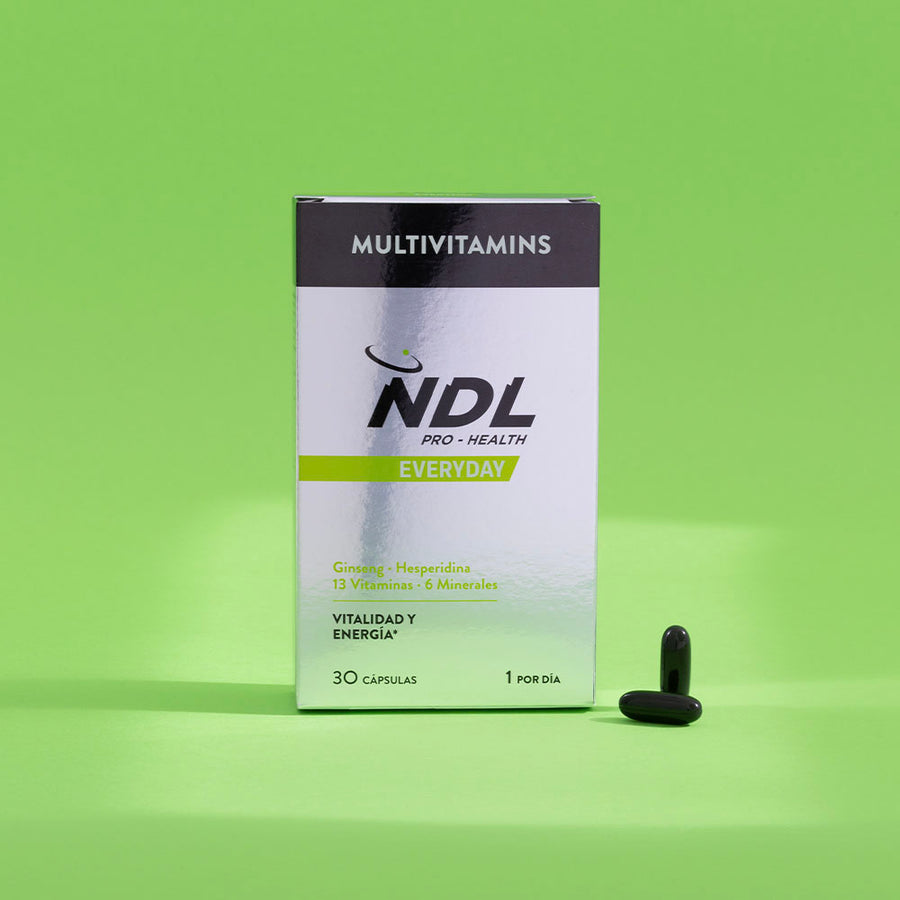Featured Products

Multivitamins and Minerals
See productLeading an active lifestyle, performing at your best at work, training intensely, and maintaining long-term health are common goals for many men. But achieving balance isn’t always easy: daily stress, poor diet, lack of rest, or simply the passage of time can lead to unnoticed nutritional deficiencies… until they begin to impact your energy, focus, or overall well-being.
In this context, multivitamins have become a valuable ally to meet daily needs for essential vitamins and minerals, support the immune system, strengthen muscular and metabolic health, and prevent physical and mental fatigue.
That said, not all multivitamins are created equal. Nutritional needs vary with age, physical activity level, and lifestyle. That’s why, in this article, we help you find the best multivitamin for men, explaining what it should contain, when it’s recommended, and which options suit different profiles.
What should a good multivitamin for men contain?
A quality multivitamin shouldn’t just offer a long list of ingredients. The most important factor is a well-balanced formula, with essential nutrients at appropriate doses targeted to men’s specific needs.
These are the key components that should be included:
Essential vitamins:
- B vitamins (B1, B2, B3, B6, B12): crucial for energy metabolism, cognitive function, and red blood cell production.
- Vitamin D: vital for immune health, bone strength, and hormonal levels—especially testosterone.
- Vitamins C and E: powerful antioxidants that help fight oxidative stress and support muscle recovery.
- Vitamin K: important for blood clotting and bone health, especially when paired with vitamin D.
Essential minerals:
- Zinc: supports testosterone production, fertility, immune function, and skin health.
- Magnesium: reduces fatigue, enhances muscle performance, and supports nervous system balance.
- Selenium: an antioxidant that protects cells and supports thyroid function.
- Chromium: helps regulate blood sugar levels.
Other functional ingredients:
- Coenzyme Q10: boosts cellular energy production.
- L-arginine, maca, or ginseng: included in some formulas to support vitality, libido, and performance.
- Omega-3 or lycopene: beneficial for cardiovascular and prostate health, especially after age 40.
Note: Not all vitamin and mineral forms are absorbed equally. A good multivitamin should use active or chelated forms for better bioavailability.
Differences between men’s and women’s multivitamins
While many vitamins and minerals are essential for everyone, nutritional needs differ based on metabolism, muscle mass, hormones, and life stages. Men’s multivitamins are therefore formulated with different goals and dosages than women’s.
Lower iron content: unlike women of childbearing age, men typically do not need extra iron. In fact, too much can be harmful, so many men's formulas exclude it or use very low doses.
More zinc and magnesium: both are crucial for natural testosterone production, physical performance, and muscle recovery. They also help combat fatigue and stress.
Prostate health support: starting around age 40–50, prostate health becomes a priority. Men’s multivitamins may include ingredients like lycopene, saw palmetto, or selenium to support normal prostate function.
Focus on energy and muscle mass: testosterone, energy metabolism, and lean muscle are key to male health. That’s why these formulas often include B-complex vitamins, vitamin D, coenzyme Q10, and more.
In short, men’s multivitamins are designed to optimize energy, physical performance, and hormonal health, while women’s versions are typically more focused on hormonal balance, bone health, and reproductive needs.
When is a multivitamin for men recommended?
While not strictly necessary for everyone, a multivitamin can be a great ally in certain situations—to prevent deficiencies, enhance daily performance, or support overall health.
Here are some of the most common cases where it’s recommended:
- Persistent fatigue or lack of energy: even with enough sleep and good nutrition, you might lack key micronutrients like B vitamins, magnesium, zinc, or vitamin D.
- Intense workouts or muscle loss: exercise or aging can increase the need for nutrients that support protein synthesis, muscle recovery, and nervous system function.
- Chronic stress or demanding lifestyle: physical and mental stress deplete vitamin and mineral reserves. Supplementing with antioxidants, B vitamins, magnesium, or adaptogens can help restore balance and focus.
- Unbalanced or restrictive diets: if your diet is irregular, vegetarian, vegan, or lacks variety, you may be missing out on iron, zinc, B12, or D. A well-formulated multivitamin can help fill those gaps.
- Decreased libido or hormonal imbalances: after age 40, testosterone levels tend to decline. Nutrients like zinc, magnesium, and vitamin D help maintain normal hormone levels.
- Over age 40–50: at this stage, cardiovascular, metabolic, and prostate health become priorities. A multivitamin for mature men can include targeted ingredients for these areas.
Choose a multivitamin tailored to your profile and needs, preferably with high-bioavailability ingredients, free from added sugars or unnecessary fillers. When in doubt, consult a healthcare professional.
How to take a multivitamin properly
Taking a multivitamin might seem straightforward, but to ensure it’s effective and safe, it’s important to follow a few key guidelines. Timing, consistency, and the way you take it all influence its benefits.
When to take it:
- With a main meal: many vitamins (A, D, E, and K) are fat-soluble and absorb better when taken with healthy fats.
- Preferably in the morning or midday: avoid taking it at night if it contains B vitamins or stimulants, as they may disrupt sleep.
For how long?
- Daily and consistently: the benefits of multivitamins are seen over the medium to long term. A consistent routine is key.
- Cyclic use: in some cases, using it in cycles (e.g., 3 months on, 1 month off) can be beneficial—especially for highly concentrated formulas.
Important precautions:
- Don’t exceed the recommended dose: too much of certain vitamins or minerals (like iron, vitamin A, or selenium) can be harmful.
- Avoid coffee, tea, or alcohol right before or after: these can interfere with the absorption of minerals like iron or zinc.
- Consult a doctor if you’re taking medication or have a medical condition: some supplements may interact with treatments or be unsuitable in certain cases.
Look for a multivitamin with high bioavailability (active or chelated forms) and one that fits your actual needs. It doesn’t have to contain “everything”—just what your body really needs.
In conclusion, a well-formulated multivitamin can be a powerful tool to support your health, boost daily energy, and prevent deficiencies that often go unnoticed. But not all men have the same needs, and not all products offer the same quality.
That’s why finding the best multivitamin for men means choosing one that suits your age, lifestyle, and health goals—whether it’s maintaining physical performance, supporting prostate health, reinforcing immunity, or compensating for a poor diet. Look for well-dosed formulas, high-quality ingredients, and good absorption—without unnecessary extras.
Remember, a multivitamin is not a substitute for a healthy diet or good habits, but when used wisely and consistently, it can make a real difference.

From the NDL Pro-Health team we will provide you with tips to maintain a healthy lifestyle. Sharing knowledge and product recommendations to offer optimal solutions for your daily routine, for your workouts and subsequent recovery, all with the goal of helping you achieve physical and mental wellness.

















